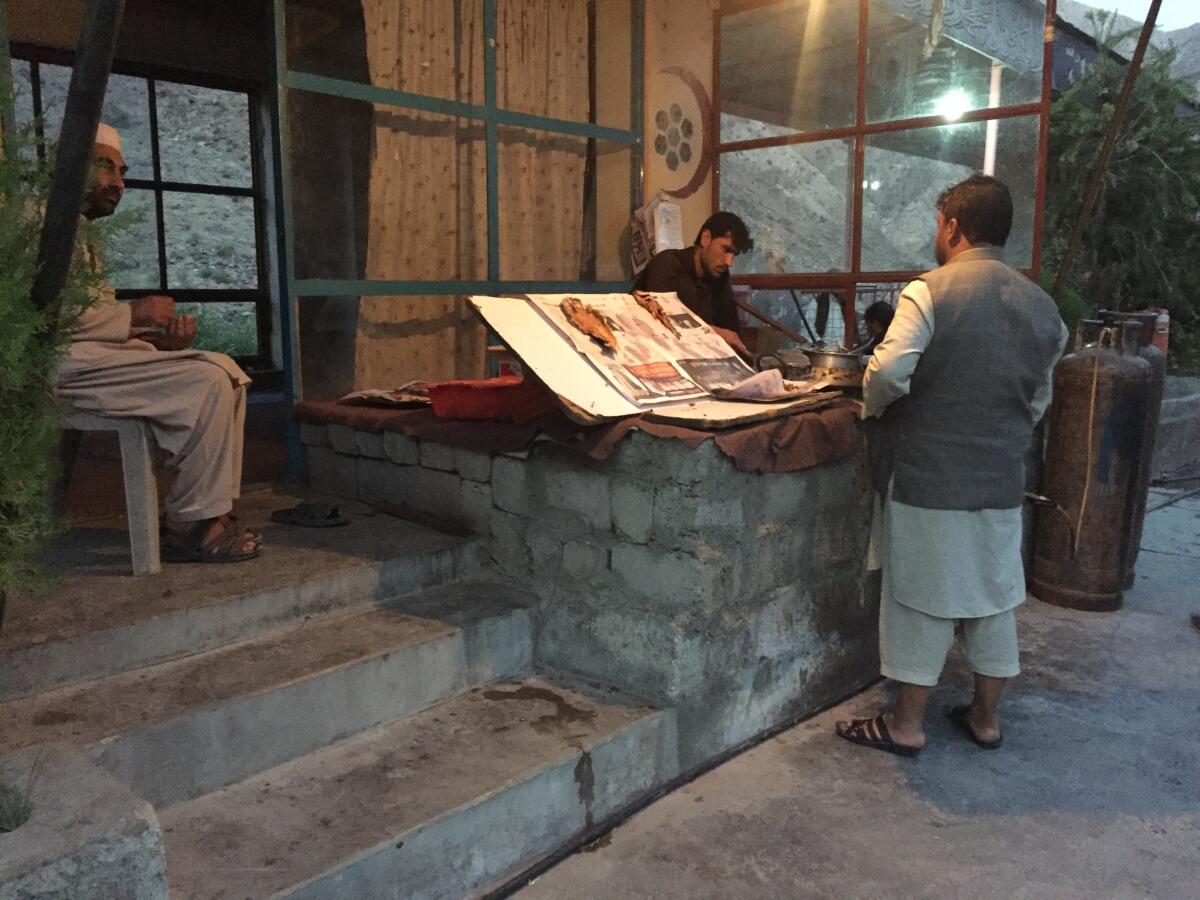This roadside salesman outside Kabul is known for selling the best hashish: ‘Everyone loves me’

- Share via
Reporting from Tangi Abresham, Afghanistan — Gula Jan ground a small amount of hashish, about the size of a marble, in his hand. He mixed it with tobacco and carefully rolled it into a cigarette. Then he smiled.
“Do you know how many people come and smoke hash here?” he said. “Thousands!”
The 34-year-old counts parliamentarians, government officials, doctors, engineers and businessmen among his clients. They all stop by his usual spot on a river bend 45 miles outside Kabul for a taste of his specialty.
As he twisted the cigarette closed, a new car pulled up with neatly dressed passengers inside. They were regulars, Gula said – Afghan employees of an international aid agency – and he ran to greet them.
Gula, who has thick eyebrows and a close-cropped beard, said that in the busy summer months, he sells hashish to as many as 100 people a day. He is known for importing the best stuff, from the remote northeastern district of Badakhshan, and in a usual month he sells nearly seven pounds – about 600 cigarettes’ worth.
I’m a salesman, but it’s also fun and good to make friends. Everyone loves me.
— Hash salesman Gula Jan
In an hour he usually makes about $60, although he says he sets no fixed price for his product.
“It depends on clients’ generosity,” he said. “Sometimes clients get high and pay a couple hundred dollars for only two segreti” — hash cigarettes.
“I’m a salesman, but it’s also fun and good to make friends. Everyone loves me.”
His spot is in Sorobi, a district outside Kabul. Gula stations himself outside a restaurant set above the Kabul River, a favorite spot for drivers heading in or out of the Afghan capital. The terrace restaurant is known for its freshly caught, golden-fried fish.
On a warm, windy afternoon, another group of regular clients, Afghans wearing traditional shalwar kameez, drove up and asked Gula to roll them a couple of cigarettes. As he stuck a bit of hashish on the tip of a key, Gula pointed to a hilltop where more than a dozen Afghan army soldiers were stationed, observing the highway, and said even they occasionally partook in the drug.
“Those poor soldiers rarely come down here and smoke hash,” he said. “The Taliban have threatened to kidnap them, so they’re concerned.”
The Tangi Abresham valley lies on Kabul’s eastern outskirts, along the road to the Pakistani border — a strategic location where foreign and Afghan military convoys have often been targeted by insurgents. The valley lies between two mountain ranges that the Taliban and other militant groups use as havens.
Gula’s business is against Afghan law, but people of all stripes smoke hashish in Afghanistan. President Ashraf Ghani even suggested during his 2014 campaign that he might consider legalizing the drug.
U.S.-led international efforts to reduce cultivation of opium, hash and other drugs in Afghanistan have largely failed. Afghanistan’s ministry of counter-narcotics says production of narcotics rose 15% in 2016 compared to the year before, with more than 500,000 acres in the country used for growing poppy and hashish.
Naeem, who like many Afghans has only one name, runs the fish restaurant, named Charsi Karak Chai, which loosely translates to “strong tea for hash smokers.”
Like Gula, Naeem, 31, is an avid hash user — the two join Gula Jan’s customers for a smoke a few times a day. It’s a symbiotic relationship: Each business helps the other.
“Customers get very hungry after a smoke,” Naeem said. “Each smoker can eat up to three kilos [about seven pounds] of fish!”
Improbable? Sure. But this is a hash story.
Along with the fish he serves doodpati, an Indian drink of black tea, milk and sugar, to hash smokers only. Customers say it increases their high.
Abdul Baqi, in his 20s, approached the restaurant. Gula opened his arms and wrapped Baqi in a hug — he was a loyal customer.
“Hey, marra,” Gula said. (“Hey, dude.”) He offered Baqi a cigarette he had tucked behind his ear.
Baqi was driving from the capital to Jalalabad, a busy town near the Afghan border — a treacherous, three-hour-plus journey along a winding, mountainous highway often jammed with trucks. Like many drivers, he believed smoking hashish relaxed him for the difficult drive while keeping him from becoming tired behind the wheel.
This time, Baqi took just a couple of puffs from Gula before stopping. “I’ve already smoked two wraps of hash while driving from Kabul!” he said with a laugh.
Faizy is a special correspondent. Times staff writer Shashank Bengali in Mumbai, India, contributed to this report.
ALSO
Afghan vice president accused of ordering sexual abuse of a rival he beat up in public
Australia closes the door on migrant boats. Will it be a model for Europe?
Americans adjust to a changed role in Iraq
More to Read
Sign up for Essential California
The most important California stories and recommendations in your inbox every morning.
You may occasionally receive promotional content from the Los Angeles Times.













